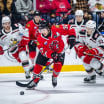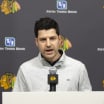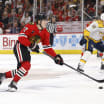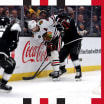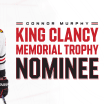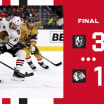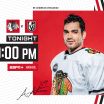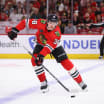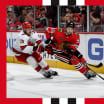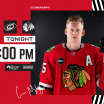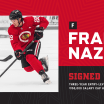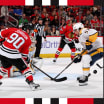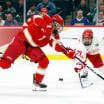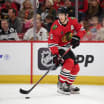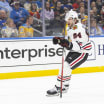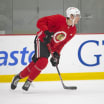So, you think you want to become a National Hockey League referee?
The adrenaline rush, the exhilaration from the crowd, the camaraderie and prestige can be extremely gratifying. But what about the arduous travel, extensive time away from home, physical demands and inevitable criticism from players, coaches, and fans?
These are all important factors to be considered.
Less than an hour before puck-drop for the Blackhawks-Sabres game at the United Center on March 6, NHL officials Garrett Rank, Pierre Lambert, Derek Amell, and Lonnie Cameron greeted two young amateur hockey referees to offer advice and answer questions about their profession after Carl Sassolino of the Illinois Hockey Officials Association made the introductions.
Krystian Szorc, 22, of Chicago and Samantha Hiller, 26, from Boulder, Colorado, entered the referees room with proper reverence and perhaps a little awe as the NHL arbiters welcomed them as part of the monthly "Referee Spotlight" program that gives two amateurs a chance to attend a Blackhawks game and learn more about becoming a professional hockey official
FEATURE: Referee Spotlight sheds light on exclusive profession
Community Correspondent Fred Mitchell dives into the program, which gives amateur officials a chance to learn from the pros
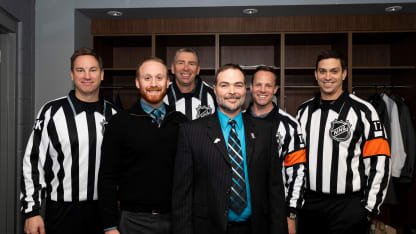
Szorc, a recent graduate of the University of Illinois, said he has been an amateur referee for eight years. He also had been playing hockey for six of those years, including club hockey at Illinois. By his junior year of college, Szorc began refereeing more regularly. He asked the NHL officials for their advice about continuing to try to advance to the next level.
Lambert, 30, said he was about the same age as Szorc when he made the commitment to pursue his dream as an NHL referee and advised him to find another day-to-day job while continuing to referee amateur games.
"There are only a few guys who are going to reach the NHL, but if you have a chance to work pro games - minor league pro games - that will be good for you," said Lambert, from St.-Hubert, Quebec. "It's a school of life. I would say to go there for a year and try to learn as much as you can. But keep in mind that you have to find yourself a job and don't put all of your eggs in the same basket because it might hurt you down the road. You are not paid a lot of money when you work the minors compared to what you can do in the city (working a regular job). Try to work pro for one year and then if you like it, go from there. That would be my advice right now."
Cameron, a linesman who is retiring at the end of this season, advised Szorc to "do as many games as you can. Do it as an apprenticeship. You are going to make a lot of mistakes and you just have to keep doing games and get better at it. That's the only way. You can read about it and do your rule books and all that. But you have got to work hockey games."
Rank, 31, told Szorc that he had a similar background when he started his pursuit to become an NHL official. "I was on an athletic scholarship and stopped playing to kind of focus on a different sport and I refereed (hockey) on the side. I worked a lot of men's league games and minor hockey, just for cash. On a Monday night when my buddies were doing video games, I would (after refereeing games) have like $100 cash in my pocket at the bar or for going to dinner with my buddies. It was a cool way for me to make some extra bucks instead of working at Subway or McDonald's when I was younger.
"Then I worked a full-time job and just refereed on the side. And then you just kind of get your lucky break and before you know it you are working your way up to different levels. It is not really a job where you can submit a resume' and say: 'Hey, I want to come work for you.' It's more that you continue to work hard, master it and become the best official in the level that you work in. And if you are good enough, eventually someone will find you."
Getting that fortuitous break to make it to the NHL also can take a bit of good fortune.
"It's all about relationships," said Amell. And that's how you get seen."
Hiller said she has dreams of one day officiating women's Olympic hockey games. And if the NHL becomes a possibility, she would love to become the woman who breaks that gender barrier. "As far as I can take that, I will," Hiller said. For now, she is officiating Division III college games and high school contests. In the past, she was able to officiate games overseas in Norway, China, and Italy.
Each of the officials addressed the best and worst parts of his chosen profession.
"I would say the best part of being an official is the game itself," said Rank, from Elmira, Ontario. "We have a lot of fun on the ice. Essentially we have the best seat in the arena. And I would say that the hardest part of our job is the travel. We have a lot of time away from home, a lot of flight delays and cancellations and a lot of time on the road. Traveling is great, but at times it becomes a bit of a hassle."
Lambert agrees wholeheartedly.
"I have a 2-month-old at home. I don't see him much, but it is part of the job.," Lambert said. "But when you are on the ice, that is the best thing in the world. It's a dream and I enjoy it."
Clearly, the officials are torn because of the benefits and perils of their job.
"The travel is the hardest, for sure," said Amell, a linesman. "I have a daughter who is a first-year student at a university and a son who is 15. He plays Youth 15 Triple-A hockey and I see probably six games out of 60 this year. You miss a lot of your kids and that kind of thing. But just hanging out with the (NHL) guys and the game...I never have to grow up. I am a 50-year-old kid, right? And it is so much fun, it keeps you young. I like that part of it."
Cameron sounded nostalgic about the final weeks of his officiating career.
"This is my last season, I am retiring," Cameron said. "I have 11 more games left. And for Pierre, this is his first season, full-time. So all of our stories of how we got here are all very similar. All of the roads kind of connect and kind of come together if everything works out for you at this destiny being the NHL. I was nine years in the Western Hockey League, working full-time and doing games (on the side) trying to aspire to be in the NHL. And 23 seasons ago I got hired. And 1,500 and some games later I am about ready to cast off to the old pasture. Me and Derek, I was the class of '96 and he was the class of '97. And here's the new guys that perpetuate it, and it is in good hands because of how much background work you have to do in order to conquer every league you can.
"We are 34 linesmen and 34 referees. That's our staff full-time. We are pretty few and far between. For me, my journey started in '87, so we are coming up on 32 years. It has been a great ride. The greatest assets you can have are patience and perseverance," said Cameron. "I was 31-years-old when I got hired (by the NHL). Almost kind of quasi-late by standards because today they seem to be a little big younger. But by the time I was hired, I had a resume that was really (good) and I had a lot of good stuff. So when I stepped on the ice for that first game, it wasn't overwhelming at all. It was a pretty smooth transition."
The four NHL officials were gracious with their time with the two amateurs and offered straight-forward advice.
"You control the things that you can control. You can control your fitness, you can control your attitude, you can control your work ethic, you can control your skating ability," said Rank. "Those are the things that really set you apart from other guys or gals. Try to work the best hockey that is available to you. Don't be intimidated by getting thrown into a big assignment or working a game that you feel might be a bit of a stretch for you. That's where you are going to learn. And it is going to make you better at the end of the day."
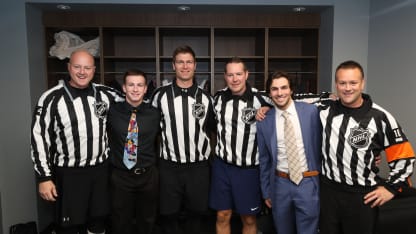
The NHL officials emphasized the importance of physical fitness both during and after the season.
"I play golf every day in the summer time," said Rank, who played in the US Open this year as an amateur. "I played well at the qualifying and got to play, which is really neat."
But in-season conditioning is not all fun and games. And it can involve a variety of activities.
"So, like this morning I got up and went to yoga," Rank said. "These (other) guys went to the gym and we went to lunch together and took like an afternoon nap. One of the big things that (the NHL bosses) are pushing right now is fitness, whether you are throwing weights around or whether you are running. Everybody is different. I like sweating and stretching more than I like working out or lifting heavy weights. Fitness is something you can control and we have a fitness test every year that we have to pass to work for the season. And at the NHL officiating combine they have a fitness thing that they go through. You won't see a guy on our staff who is out of shape or doesn't work hard on his fitness level."
Even proper nutrition is a point of emphasis for an NHL official these days.
"Guys... what they order at lunch nowadays is even different from five years ago when I started," Rank said. "When I first started, I had chicken (parmesan) every day. And I would say that probably 70 to 75 percent of the guys order salads at lunch now. That's just kind of the way it has gone."
When it comes to officiating games, hockey officials are not only subject to being hit by flying pucks or being knocked into the boards by players, but bones and ligaments are often snapped or strained.
What are the most common injuries for NHL officials?
"Bad backs and bad knees," said Cameron, who served as a linesman in his 1,500th NHL game on Feb. 25. "Lower body, hips...the wear and tear on this job on our bodies is such that it is a grind. It's not necessarily on the ice. It's sitting on a plane for three or four hours. You start feeling your hips. The key to a long career,--you knock on wood-- you don't get injured, just experiencing kind of an injury-free season. We've got 68 guys full-time, we've got a few guys in the minor leagues that are there and they are getting called up to call games for injured guys. We've got a couple of guys out right now with knees and torn shoulders and stuff like that."
Many times NHL officials simply have to tough it out to make it through a game while injured or sick.
"There's no hang nails for missing a game," Rank said. "The flu doesn't do it."
Yet the good seems to outweigh the bad as NHL officials assess their experiences.
"My favorite memory was probably that first game," Cameron, 54, said. "It was a Saturday night, October 5th (1996). It was Hockey Night in Canada with Vancouver and Calgary. I've got a memory like an elephant, which is not necessarily a good thing. But you aspire for it, you want it so bad. You dream it and it is like, there it is."
Amell, 50, recalled: "I did the gold medal game in Sochi (in 2014). It was Canada vs. Sweden. That was probably the biggest game I have done."
Lambert added: "Game 7 of the Calder Cup Finals last year. That was really fun. You don't get to work that game often. But when you are selected for one of these games...that's why we are reffing, right? We all want to work a Game 7. That was my best moment."
Rank had a self-deprecating laugh as he recalled an indelible memory.
"My biggest moment was my first game (Jan. 15, 2015). I made the wrong call five minutes in, so I got yelled at. Welcome to the National Hockey League," said Rank. "It was in Buffalo and it ended up 7-0 Minnesota. There was like a scramble at the net and everybody ran into the goalie and the net came flying off. I had no idea of how the puck went in. I blew the whistle and all of a sudden people say the puck is in the net, right there. And I said: 'No, thats no goal!'
"Then I went to review and they said: 'Who do we have on the mike?' And I said it's Rank.' And they said: 'Oh, welcome to the Big Show. 'What do you have on the ice?' I said: 'Honestly, I have no (bleeping) idea.'
"They said we are looking at it and it looks like the puck went in legally and nobody hit the goalie prior. 'So, yeah, you've got to count this. It's a good goal, so go make the announcement.'
"So I said: 'What do you want me to say?' They told me: 'Just say that the puck entered in a legal fashion and we have a good hockey goal.' I think I ended up saying: 'The goal crossed the goal line. 'We've got a goal!'
"It was pretty funny."
With that humorous anecdote, the four officials ended their 30-minute session with the two eager amateur officials and began stretching for their assignment on the United Center ice.
The two young amateurs came away enlightened with insightful, straight-forward information about what it takes to become an NHL referee.

